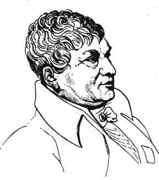Person: Gompertz, Benjamin

Benjamin Gompertz was an English self-educated mathematician and actuary, who is best known for his "law of mortality".
Mathematical Profile (Excerpt):
- Benjamin was self educated, learning mathematics by reading Newton and Maclaurin.
- Gompertz himself joined the stock exchange in 1810 and he became a Fellow of the Royal Society in 1819.
- Gompertz applied the calculus to actuarial questions and he is best remembered for Gompertz's Law of Mortality.
- Hence, when death rates are plotted on a logarithmic scale, a straight line known as the Gompertz function is obtained.
- The slope of the Gompertz function line indicates the rate of actuarial ageing.
- The differences in longevity between species are the result primarily of differences in the rate of ageing and are therefore expressed in differences in slope of the Gompertz function.
- Gompertz also wrote about scientific instruments, writing Theory of astronomical instruments (1822), A new instrument called the differential sextant (1825) and On the converted pendulum (1829).
- Gompertz assisted Baily in calculating positions of stars which was eventually published as Baily's Catalogue giving the constants for 3000 fixed stars.
- Gompertz was a founder member of the Royal Statistical Society in 1834.
- It was decided at this meeting that the Society would publish a journal, the Proceedings of the London Mathematical Society, and Gompertz began work on a paper which he intended to submit for publication.
- Tables of lives and tables of stars were generated by the same qualities and both represented a rationalizing spirit which informed the social philosophy of Gompertz and his friends ...
Born 5 March 1779, London, England. Died 14 July 1865, London, England.
View full biography at MacTutor
Tags relevant for this person:
Astronomy, Origin England
Thank you to the contributors under CC BY-SA 4.0! 

- Github:
-

- non-Github:
- @J-J-O'Connor
- @E-F-Robertson
References
Adapted from other CC BY-SA 4.0 Sources:
- O’Connor, John J; Robertson, Edmund F: MacTutor History of Mathematics Archive
